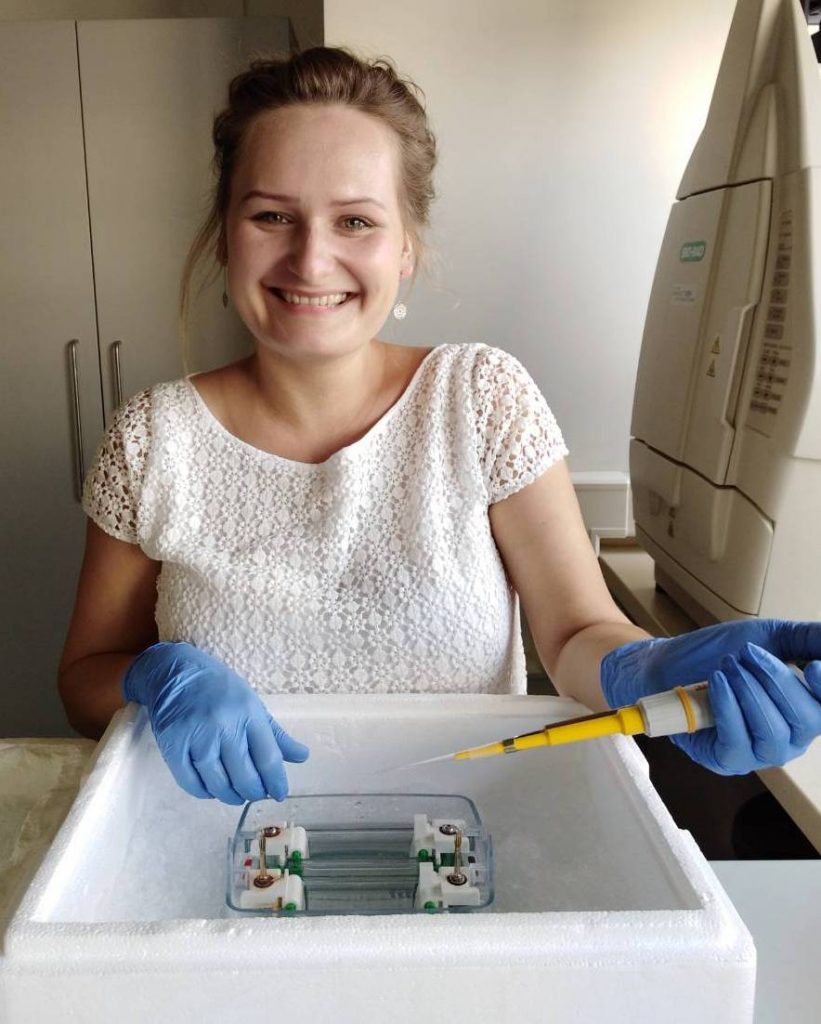RESEARCH EXCELLENCE INITIATIVE
FREEDOM OF RESEARCH – SCIENCE FOR THE FUTURE
„Freedom of research – science for the future” series consists of articles, interviews and short videos presenting research conducted by winners of the call for proposals
Prof. Anna Mrozek-Wilczkiewicz | biophysicist
Searching for new medications is not a bed of roses
|Katarzyna Stołpiec|
Cancer is one of the most complex problems facing medicine. For many years scientists from all over the world are trying to find an effective solution to eradicate cancer or to slow down its progression. Despite the various treatment options that are less or more invasive, none of them can be described as a cure. Anna Mrozek-Wilczkiewicz, PhD, DSc, Associate Professor from the Faculty of Science and Technology of the University of Silesia in Katowice focuses her research efforts on the issue of cancer and its prevention. This scientific and medical area has been recognised by the “Freedom of research” university call for proposals as part of the Research Excellence Initiative.

Together with her team, Prof. Anna Mrozek-Wilczkiewicz searches for compounds that could be used in producing anticancer medications. “Cancer is a difficult disease,” says the researcher. “There are several types of cancer, each with its own distinctive features and treatment options, and that’s why the “silver bullet” to inhibit their development is so hard to find. The research conducted by our team is focused mainly on pancreatic and brain cancer, the so-called glioma. These are some of the most difficult diseases to treat, with the least favourable prognosis.
It is hard to prevent cancer from developing. It is a disease that progresses unnoticed. It involves the uninhibited multiplication of abnormal cells that are not subject to apoptosis, which is the process of natural self-destruction of cells. Apoptosis is one of the natural biological processes “programmed” in our bodies. It controls the condition of cells and destroys the ones that were damaged or mutated and can no longer positively contribute to normal human development. Despite signals sent to the cancer cells about their forced self-destruction, a contradictory reaction takes place. The cells multiply independently. In such cases, the processes taking place in a human body are insufficient to such an extent that even a person’s life can be at risk. Medical intervention is necessary.
“Our goal is to thoroughly investigate the first of several stages “from identification to implementation,” states Prof. A. Mrozek-Wilczkiewicz. “Fundamental knowledge is vital when it comes to the development of new medications, that is why we investigate issues not yet described in the literature. Our work and observations, precisely because of their fundamental nature, are an important first step for the subsequent scientific processes and perhaps as a result, for medical procedures. We try not to limit ourselves and study various compounds form different groups that could have a positive impact on cancer prevention, starting with vitamins, through brand new derivatives, up to analogues of well-known medications used in pharmacy. We conduct research on isolated human cells, which is why the costs of such analyses are very high. Thanks to the “Freedom of Research” call for proposals we can continue our research and broaden our specialised knowledge.”
Photodynamic therapy (PDT) is known in the global market as a method of irradiating cancer cells, which is much less destructive to the human body than chemotherapy, and therefore safer.
“This method is still not well known in Poland due to its character, costs, and some of its limitations,” states the researcher. “As a result of using photosensitising substances, light and oxygen dissolved in our tissues, a phototoxic reaction takes place. The treatment regimen is a follows: after administering a photosensitising substance the tumour is irradiated with light of an appropriate wavelength and then reactive oxygen species are generated, which have a destructive effect on the tumour. It is worth mentioning that only cancerous tissues are destroyed in the process, healthy tissues are not impacted, as is the case with chemotherapy. The additional advantage of this form of treatment is that it can be repeated, unlike the classic treatment with the use of cytostatic agents. Multiple chemotherapy sessions are destructive to the human body to such an extent that often subsequent administration is not possible. Our team carries out extensive research to eliminate some of the limitations of PDT, which could help popularise this patient-friendly method of cancer treatment in Poland.
Prof. A. Mrozek-Wilczkiewicz, leader of the Pharmaceutical Biophysics Team of the Faculty of Science and Technology, when asked about ways in which people can protect themselves from cancer answered that aside from living a healthy lifestyle, being happy is the best medication. “A healthy and rational lifestyle has a great impact on the health and functioning of our organism. An unhealthy diet or excessive use of stimulants often have a direct impact on our well-being and on how well we function on a daily basis. In addition, high levels of endorphins and dopamine inhibit release of free radicals, protecting us from various diseases, including cancer. A positive outlook, making friends and living in harmony with yourself can sometimes do more than medicine can.”





